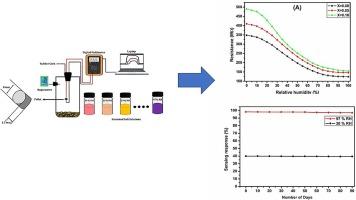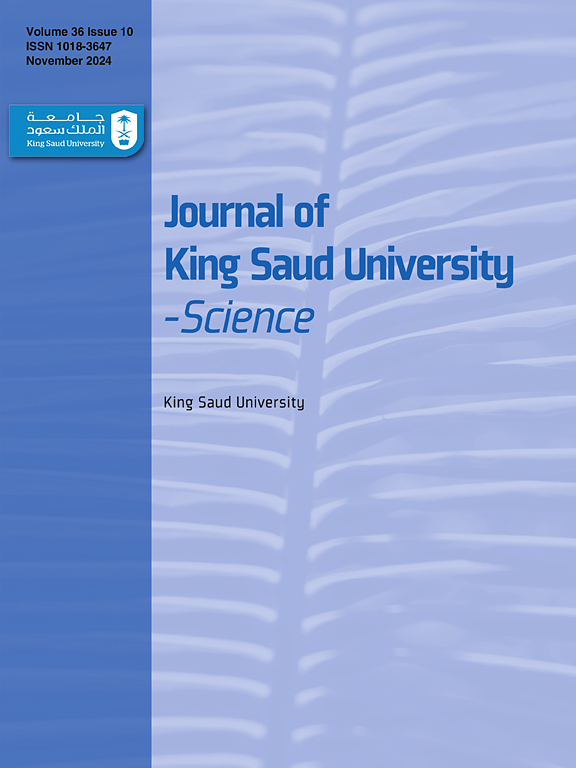Facile synthesis of cerium doped Co-Mn-FeO nano ferrites as highly sensitive and fast response humidity sensors at room temperature
IF 3.6
3区 综合性期刊
Q1 MULTIDISCIPLINARY SCIENCES
引用次数: 0
Abstract
Herein, this work presents the facile synthesis of Cerium (Ce3+) doped Cobalt-manganese-iron oxide ferrite as an effective humidity sensor operated at ambient temperature. This work reports, one step solution combustion technique to synthesize Co0.5Mn0.5Fe2−xCexO4 (x = 0.0, 0.050 and 0.1) ferrites. The structural and morphological features of the synthesized Co0.5Mn0.5Fe2−xCexO4 ferrites NPs were investigated through scanning electron microscope (SEM), X-ray diffraction (XRD), Fourier transform infrared spectroscopy (FTIR) and ultraviolet visible (UV–visible) spectroscopy. The XRD results indicates the creation of single phase in pure Co0.5Mn0.5Fe2−xCexO4 ferrite that remains unchanged by the mechanism of Ce3+inclusion. The humidity sensing mechanism was systematically investigated using adsorption–desorption isotherms. Highest humidity sensing response was achieved for Co0.5Mn0.5Fe2−xCexO4 (x = 0.1) ferrite of the order of 98 % in comparison to the pure Co0.5Mn0.5Fe2−xCexO4 (x = 0) which is about 41 %. The sensors response and recovery times for the Co0.5Mn0.5Fe2−xCexO4 (x = 0.1) was recorded to be 36 s and 63 s respectively and the sensors long term stability was examined for a duration of 90 days. The results of the present investigation offer new dimensions to fabricate high performance, room temperature operable humidity sensors for next generation sensors applications.

在室温下轻松合成掺铈 Co-Mn-FeO 纳米铁氧体作为高灵敏度和快速响应湿度传感器
本文介绍了掺杂铈(Ce3+)的钴-锰-氧化铁铁氧体的简便合成方法,这种铁氧体是一种可在环境温度下工作的有效湿度传感器。本研究采用一步溶液燃烧技术合成了 Co0.5Mn0.5Fe2-xCexO4(x = 0.0、0.050 和 0.1)铁氧体。通过扫描电子显微镜(SEM)、X 射线衍射(XRD)、傅立叶变换红外光谱(FTIR)和紫外可见光谱(UV-visible)研究了合成的 Co0.5Mn0.5Fe2-xCexO4 铁氧体 NPs 的结构和形态特征。X 射线衍射结果表明,在纯 Co0.5Mn0.5Fe2-xCexO4 铁氧体中形成了单相,而在 Ce3+ 加入的机制下,单相保持不变。利用吸附-解吸等温线系统地研究了湿度感应机制。与纯 Co0.5Mn0.5Fe2-xCexO4(x = 0)的湿度传感响应约为 41%相比,Co0.5Mn0.5Fe2-xCexO4(x = 0)铁氧体的湿度传感响应最高,达到 98%。据记录,Co0.5Mn0.5Fe2-xCexO4(x = 0.1)传感器的响应和恢复时间分别为 36 秒和 63 秒,传感器的长期稳定性测试持续了 90 天。本研究的结果为下一代传感器应用提供了制造高性能、可在室温下操作的湿度传感器的新视角。
本文章由计算机程序翻译,如有差异,请以英文原文为准。
求助全文
约1分钟内获得全文
求助全文
来源期刊

Journal of King Saud University - Science
Multidisciplinary-Multidisciplinary
CiteScore
7.20
自引率
2.60%
发文量
642
审稿时长
49 days
期刊介绍:
Journal of King Saud University – Science is an official refereed publication of King Saud University and the publishing services is provided by Elsevier. It publishes peer-reviewed research articles in the fields of physics, astronomy, mathematics, statistics, chemistry, biochemistry, earth sciences, life and environmental sciences on the basis of scientific originality and interdisciplinary interest. It is devoted primarily to research papers but short communications, reviews and book reviews are also included. The editorial board and associated editors, composed of prominent scientists from around the world, are representative of the disciplines covered by the journal.
 求助内容:
求助内容: 应助结果提醒方式:
应助结果提醒方式:


